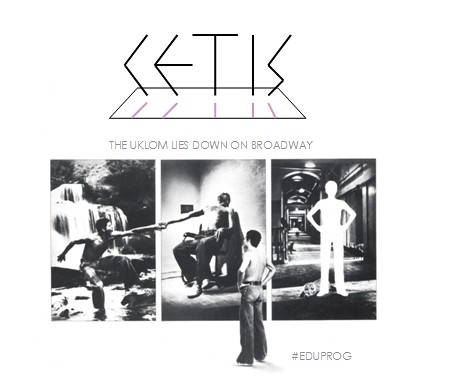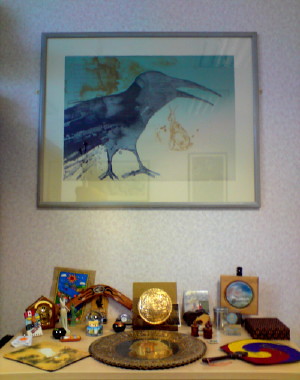Famous deceased name checked at cetis08.

Plato

Herbert Marcuse

Martin Heidegger

Jean Francois Lyotard

Vladimir Ilyich Lenin

Josef Stalin

Peter Kropotkin

Marshall Mcluhan

Cozy Powell
Famous deceased name checked at cetis08.

Plato

Herbert Marcuse

Martin Heidegger

Jean Francois Lyotard

Vladimir Ilyich Lenin

Josef Stalin

Peter Kropotkin

Marshall Mcluhan

Cozy Powell
The Open Educational Resources session at CETIS08 was a little different from the other conference session in that it aimed to provided participants with some background to the forthcoming JISC / HEFCE OER programme while at the same time giving them an opportunity to comment and provide input. Further information on this call is available from the JISC press release.
(This post summarises the presentations given at this session, Ill cover the discussion in a separate blog post.)
Overview of JISC Open Educational Content Programme
– David Kernohan, JISC
The session opened with a presentation by David outlining the rationale behind this call which is both timely, the OER movement is making real progress worldwide, and opportunistic, the money just happens to be available right now. David also pointed out that HEI business models have changed significantly in recent years as a result of the information explosion. Institutions are no longer the sole repositories of information and knowledge. Information is now ubiquitously availably through multiple channels, not least the Internet. However there is a difference between accessing information and developing learning and understanding and this is where HEIs still have a key role to play.
David acknowledged that there are still considerable barriers to reusing educational content not least of which is IPR. However JISC are not intending to use this call to fund and develop a license structure, rather it is intended to support institutions to develop a process for licensing- whether that be CC or any other type of licence that enables open access to content. Buying licenses is not a sustainable model, changing practice is.
Clearly there is still a risk that institutions and individuals will balk at the idea of “giving away” resources with potential value during a time of recession. However they need to realise that the potential value of new students and enhanced institutional and individual reputation is potentially of greater value than that of the content. This point was neatly illustrated by Patrick McAndrews impromptu presentation which included real evidence of the benefit to the OU of the Hewlett funded Open Learn project.
So while the immediate aim of this call is the online release of existing UK HE learning content licensed for worldwide open use and repurposing the real goal of this programme is to help institutions develop processes and policies that result in sustainable open access to content.
(As this programme is currently at the policy in development stage Davids presentation will not be circulated until the call is released. )
Technical Infrastructure for Open Educational Content
– Amber Thomas, JISC
Next up was Amber who outlined the technical infrastructure approach that JISC are proposing for the OER Programme. Rather than mandating the use of Institutional Repositories and specific licenses, standards and application profiles a more lightweight approach to technical infrastructure is being explored. Content may be released anywhere, in any format, under any appropriately open license however the onus will be on the individual projects to ensure that their content is discoverable, accessible, reusable, attributable, copyright cleared, openly available and supported by stable URIs and a minimum set of tags.
To balance this œanything goes approach there will also be a centralised aggregation of content in JorumOpen. However at this stage it is yet to be decided whether this means all content must be deposited in JorumOpen or linked there. This aggregation of content will enable JISC and HEFCE to showcase the outputs of the programme and will hopefully also provide the potential to build rich services on the aggregated resources
This is a relatively new approach to programme infrastructure and there is still much to be discussed and decided, in particular what constitutes the minimal technical requirements for tagging and persistent identifiers.
The trick here is to balance openness with consistency. The programme will attempt to stitch together an infrastructure based on existing workflows, commonly used tools and the services that can be built around them. Its not just about the content but the role of content in social networks and its not about forcing change but about supporting those that already want to change.
Open Educational Resources “ Opportunities and Challenges for HE
– Li Yuan, CETIS
The final scheduled presentation of the session was from CETIS own Li who presented a summary of her whitepaper Open Educational Resources “ Opportunities and Challenges for Higher Education. Im not going to go into the detail of Lis presentation her as her whitepaper has already been extensively blogged about and her slides area available on the OER session wiki page.
We were also lucky to have two additional and unscheduled presentations from Peter Douglas on the forthcoming JISC commissioned study on business cases for sharing e-learning materials being undertaken by Intrallect and Lou McGill and from Patrick McAndrew on Open University’s OpenLearn project.
Good intentions: improving the evidence base in support of sharing learning materials
– Peter Douglas, Intrallect
This study, which will be reporting shortly, focuses on the business case for sharing e-learning materials, sustainability and levels of openness. The study reports that many projects that started in or around 2002 had very similar aims to the current OER programme but ultimately haven’t been very successful. Understandably it has been difficult to learn why these initiatives failed as institutions are unwilling to publicise their lack of success. Traditionally institutional business models and IPR policies are developed by enterprise/knowledge transfer departments, which are often driven by rather more commercial ideology than academic departments. However it appear that many institutions are currently in the process of transitioning these business models. The impact of this transition remains to be seen.
OU OpenLearn and OLNet
– Patrick McAndrew, Open University
OpenLearn has had considerable impact on the Open University, this is measurable in terms of bringing students into the institution. An estimated 7000 registrations are a direct result of OpenLearn and it is 5th on the list of reasons why people come to the OU. OpenLearn is aimed at primarily at learners rather than other educators, content is the attractor, but the push is for education.
The OU has also set up a range of low-level partnerships based on OpenLearn, this was not a predicted outcome of the project, its a whole new approach to collaboration. Initially the OU found it was surprisingly hard to convince people that Openlearn materials were actually free and somewhat surprisingly there has been little demand for OpenLearn content from the JISC RePRODUCE projects.
OER is about giving permission in advance for things that otherwise have to be negotiated and therefore might never happen. Its about “you act openly, we act openly, let’s collaborate”. However things take time, open collaboration really scales up the time element, its impossible to realistically measure impact over a one year period in any sensible way.
The OU and Carnegie Mellon University have now received additional funding from the Hewlett Foundation for OLNet – a network to support sharing methodologies and evidence on the effectiveness of OERs. This next wave is about impact, evidence and effectiveness.
Without a doubt the zenith of the recent CETIS08 conference has to be the evolution of a new concept in educational technology – eduprog.

(copyright: it’s Phil’s fault)
Eduprog crystalised from the domains of metadata, repositories, educational technology and unusual puddings and is set to challenge edupunk as the real underground movement of the moment. Seizing the zeitgeist by the scruff of the neck the term was coined by Peter Obee and formalised by andypowe11
suggest we need to get in the habit of writing eduProg as #eduprog if we seriously want the concept to challenge #edupunk
This genre defining movement perfectly reflects a domain that generates questionable “concept” specifcations of baroque complexity (cf. FRBR, IEEE LOM) and application profiles and reports the equivalent of extend guitar solos (cf. DC Description Set profile & UKLOM Core, from the eduprog back catalogue). Phil Barker has recently confirmed that the forthcoming LMAP report will be published with a gatefold sleeve.

(copyright: David’s fault this time)
Eduprog has spread over the twittosphere like a gold lurex cape and has already generated considerable sage discussion and chin stroking.
Some have been inspired, others critical
#eduprog much better reflects the true state of education technology- long-winded, self-indulgent, boring standards-making
“long winded and self-indulgent” or virtuoso boundary pushing redefining forms and developing new techniques?
Recalling last night’s discussion of the potential for a prog concept album based on FRBR, double album, one side per Group 1 entity
the AV equivalent of restringing a 12 string electric lute going on here…
Last word has to go to one who was there at the dawn of eduprog:
I’ll get me cloak….

So that’s it, #cetis08 is all over bar the blogging and the occasional tweet. I’ll be attempting to synthesise the discussions from the OER session over the next few days but in the meantime here are my highs and lows of the last couple of days:
High Points
Low Points
A couple of weeks ago I wrote a post summarising a discussion that had take place at RPAG prompted by Andy Powells suggestion that
…the issues around learning object repositories, certainly the softer issues like what motivates people to deposit, are so totally different from those around research repositories that it makes no sense to consider them in the same space anyway the issues around learning object repositories, certainly the softer issues like what motivates people to deposit, are so totally different from those around research repositories that it makes no sense to consider them in the same space anyway.
This sparked considerable discussion on the RPAG mailing list the highlights of which are summarised here.
Steve Hitchcock was first up with the suggestion that we should focus on the œI of Institutional Repositories and asked
Are there personnal, domain and institutional perspectives to consider? And how do they relate to each other?
Amber Thomas agreed learning materials are different because
- The priority isn’t to expose them by OAI-PMH (people don’t use oaister etc for finding learning materials, they use google)
- They are referred to as open content, open educational resources etc rather than open access
- The argument for open access is different, has different rhetoric and different stakeholders
- They won’t often be institutional with a capital “I” they are more likely department or project or cross-institutional
Charles Oppenheim was also in agreement:
…learning materials are different in all sorts of ways, most importantly the (normally) absence of a commercial third party stakeholder (in contrast to research outputs) and the attitudes of the owners to sharing.
Andrew Rothery, who has already commented extensively on the pros and cons of using repositories to manage teaching and learning materials, suggested that we need to distinguish between different types of learning materials
Across the country, thousands of tutors are uploading substantial quantities of their own materials into their institutional VLEs every week. Broadly speaking these are the materials which institutions find hard to manage in conventional open access repositories and these are the ones which relate to different concepts, and need different approaches.
Yes, there are some resource collections which could be archived in a more formal repository system, a bit like text books or teaching materials which get published.
But that still means the whole question of learning and teaching materials needs its own perspective so we can make progess with designing appropriate repository systems.
It’s much harder to deal with the kind of resources Andrew identifies than collections of learning objects which may have been designed with re-use, re-purposing and “publication” in a LO repository in mind. The former are exactly the type of materials that have traditionally been regarded as ephemera but these are the resources that facilitate a key part of the institutions’ core business: teaching and learning. Should we be considering strategies to manage these resources?
Tom Franklin took a somewhat different perspective and cautioned against creating a dichotomy between teaching and learning materials and scholarly publications and suggested that we should also consider other resource types such as research data, archival data and student created content. While agreeing that we need to focus our efforts Tom added that we also need to be inclusive of a wide range of content types.
Finally Chris Awre provided a very neat summary of the issues we need to address:
…it is hard to imagine that research outputs and learning materials are different in ALL respects, even if there are clear differences in some areas. The issue in the debate about whether to include learning materials seems related to one area of repository activity, that of open access, and, while this is clearly a key aspect of why we are establishing repositories it is not the whole story: there are vast swathes of digital content out there that need managing for a variety of purposes but where open access is not on the agenda (or only a part of it).
It may, thus, be useful to gather evidence and thinking on how different types of materials are different to better understand where different approaches are required and where a similar or common approach can be taken: Ambers points are a step along this path and I agree that a focus on learning materials would be helpful. Whilst considering the differences from an open access perspective will be one factor within this, a multi-faceted view needs to be taken to address all potential institutional requirements.
It is encouraging that there seems to be general agreement that we need to consider the differences and similarities between various resource types and the objectives and requirements of their users and that we should focus more on these objectives and less on a single technical approach to meeting these objectives.
Ron Cookes recent report to John Denham MP On-line Innovation in Higher Education is an interesting and thought provoking current “must read”.
The report identifies priorities for action to ensure that
UK Higher education remains worldclass and ¦ at the cutting edge of the global ICT economy
and also calls for a clear long-term vision to achieve this goal. Cooke outlines requirements and recommendations for three areas that require greater strategic direction; Learning and Teaching, Research and Innovation and Management and Administration.
The section on learning and teaching is of particular interest as it places considerable emphasis on the growing importance of open educational content. Indeed the reports first recommendation calls for:
A new approach to virtual education based on a corpus of open learning content: the UK must have a corpus of open access learning resources organised in a coherent way to support on-line and blended learning by all higher education institutions and to make it more widely available in non-HE environments.
An admirable goal indeed, however I am less sure about the need for
…national centres of excellence to provide quality control, essential updating, skills training and research and development in educational technology, e-pedagogy and educational psychology.
Should we not be focusing on the ability of ICT and in particular social networking technologies to disseminate expertise throughout the sector rather than centralising it at a number of exemplar institutions? I also rather non-plussed by the suggestion that
¦a national centre of open access course materials, for example through the Open University, is a potential model worth considering¦
Dont get me wrong, I think the OUs Open Learn project is a world-class initiative and one that we should all look to and learn from, however the OU business model is somewhat unique in the UK and what works for the OU will not necessarily work for other HEIs.
In contrast I am particularly encouraged by Cookes call for all HEIs to develop a strategic approach to information management:
Information resources are expensive and need to be managed as strategically as financial and human resources to improve the effectiveness of institutions.
In addition the reports emphasis on the importance of developing literacy and technology skills for both staff and students is highly commendable. Technology focused staff development initiatives seem to me to be lagging further and further behind technological innovation. Any initiatives that could help to bridge this gap would be a major step in the right direction.
While I agree with most, if not all, of Cookes recommendations there seems to me to be a strong, and perhaps somewhat dated, centralising theme running through the report. This is evidenced by the call for national centres of excellence and œcurated and organised collections of open learning content. The report also makes some questionable statements about repositories, for example:
¦it should not cost more to make course materials openly available on professionally managed repository platforms.
And rather worryingly, although the report includes an appendix of significant JISC programmes there appears to be no mention of Jorum and the potential strategic role it could play in facilitating and curating a UK network of open educational resources. Perhaps I missed a footnote somewhere.
I havent commented on the Research and Innovation and Management and Administration sections of the Cooke report as these really arent my areas of expertise however there are a couple of points relating to the interface between research and teaching and learning that are worth highlighting:
in research led universities there is a need to link effectively research resources with learning and teaching.
It is taken for granted in the research process that one builds on the work of others; the same culture can usefully be encouraged in creating learning materials.
So, a thought provoking and encouraging report overall but perhaps one that needs to widen its vision somewhat.
My colleague Li Yuan has now uploaded the outline for the OER Programme Scoping Session at this months CETIS Conference which takes place in Birmingham on the 25th & 26th November. This is your chance to comment on and provide input to the forthcoming £5.7 million JISC open educational content programme. The session will include three short presentations covering an over view of the JISC programme by David Kernohan, technical infrastructure for OER by Amber Thomas and opportunities and challenges for higher education by Li. These presentations will be followed by an open discussion which I’ll attempt to chair :-} Given the level of blog traffic and discussion that OER has generated over the last few weeks alone this could be a lively debate!
There are still a few places available at the CETIS Conference so if you’d like to come along and add your voice to the discussion you can register here
Scott Leslie’s timely and thought provoking blog post on Planning to Share versus just Sharing has already generated considerable comment and discussion on Scott’s own blog and on other blogs including by colleague Sheila’s Work Blog and Dorothea Salo’s Caveat Lector. While I wholeheartedly agree with the issues Scott raises I’m inclined to argue with the following comment from Jim Groom.
You nail the inanity and paralysis that pervades the whole conversation around sharing at an institutional level perfectly. I wonder how many big universities are joining OCW and the like because it is a good PR move, or the thing to do currently.
I think institutions can and do have valid reasons for launching OCW / OEC / OER (pic yer acronym!) initiatives that are different from those of individuals. I also think that good PR is arguably a valid reason for institutions to invest in opening access to educational resources. Institutions are business after all, as businesses they need some form of PR and if the route taken also opens access to resources that can then be used by others surely that’s so much the better?
Or perhaps not. This point is being hotly debated over on Abject Learning where Brian Lamb asks
…higher education is still conducting its business as if information is scarce when we now live in an era of unprecedented information abundance.
…if we live in an era of information abundance, why is the primary drive around OERs the publication of more content?
The discussion that follows suggests to me however that there is considerable ambiguity regarding what we mean by “content.” This from Laura:
higher ed *is* so focused on content. Faculty at many places do not get tenure from providing an education for their students, but from producing content (usually for certain journals or publishing houses) and this is what we need to get away from I think. We need to shift the focus away from producing content and back to education, writ large. For that focus on content also leads to the content-based class that’s all about “covering content” rather than encouraging thoughtful discussion, even about content-rich topics like biology or physics.
Tbh I think this is a rather spurious argument. The kind of content Laura seems to be referring to is scholarly publications. The drive to publish can certainly distract from the practice of teaching but does it really lead to content driven education? Maybe I was just lucky but I never felt my higher education was just about “covering content”.
Interestingly one of the most astute comments in this discussion comes from the same Jim who I’ve already quoted above (my emphasis btw):
I think it is the discusion and interaction that is still missing from the OER/OpenEd movement.
What universities need to be thinking about is ways to use syndication and open architecture to provide mechanisms of sharing and bringing together the various resources and inquiry around such a topic
Universities and colleges can seize the opportunity to frame these spaces for they have the unbelievable intellectual resources to help manage these distributed discussions, and interrogate the information that is already out there. The value of the institution is not based in content per se, but in framing the discussion and thinking about that content, and that’s why thinking about open models of self-organization around these ideas for universities is an important next step, for they pay for the intellectual capital of scholars, and those individuals are one key way for making those resources, objects, or things animate into something special.
I also particularly liked Marion Jennsens comment:
“…higher education is still conducting its business as if information is scarce…”
That is because they still have the one thing that IS scarce, and that is certification.
It seems clear to me that OER / OEC / OCW is curently acting as a catalyst that is surfacing a wide range of issues relating not just to “content” but to individucal practice, institutional culture and the current paradigm of higher education in general.
Given that JISC is about to pour £5.7 million into opening access to educational resources at institutional, subject and individual level it’s going to be very interesting to see how these debates develop.
We have a new art collection in the CETIS office at CAPLE on loan from the Collins Gallery at the University of Strathclyde.

The print on the right is “Into the Depths” by Marie Barbour, the one in the centre is “Three Florentines in the Burning Sand” by Tsisumi Ota and the one on the left is “The Minotaur” also by Tsisumi Ota, both are from a series of prints inspired by Dante’s Inferno.
These prints join our existing art work “Crow” by Elspeth Harris, pictured below with our fabulous international office tat collection.

The JISC SemTech Project, funded as a direct result of last year’s JISC CETIS Conference, has published a draft of the questionnaire that they will be using to gather information about examples of semantic technologies used in the domain of teaching and learning. Thanassis and the project team are seeking comments on the draft questionnaire which can be accessed from the project blog at http://blog.lsl.ecs.soton.ac.uk/semtech/